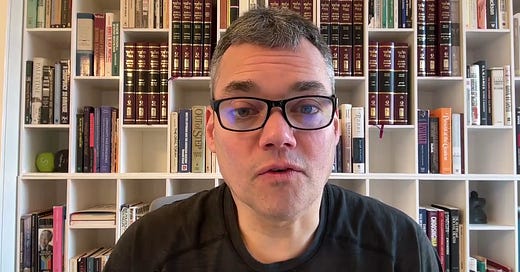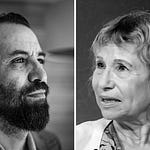Our Zoom call this week will be at our normal time: Friday at Noon EDT.
This Friday, I’ll be answering questions. Feel free to ask me anything during the Zoom call and I’ll do my best to answer. Since I just published an essay in the New York Times about the historic rupture between American Jewry’s two dominant creeds— liberalism and Zionism— I thought it might be a good moment to talk directly with you.
Paid subscribers will get the link this Tuesday and the video the following week. They’ll also gain access to our library of past Zoom interviews with guests like Rashid Khalidi, Thomas Friedman, Ilhan Omar, Benny Morris, Noam Chomsky, and Bret Stephens.
Sources Cited in this Video
The studies showing a correlation between Israel’s killings of Palestinians and reported antisemitic incidents in the US, Belgium, and Australia.
Why pro-Israel donors objected when Harvard and Stanford appointed Jewish scholars who study antisemitism to study antisemitism on campus.
A pro-Israel speaker’s talk is disrupted at Berkeley. (The speaker returned and was allowed to speak.)
Things to Read
(Maybe this should be obvious, but I link to articles and videos I find provocative and significant, not necessarily ones I entirely agree with.)
In Jewish Currents (subscribe!), on the occasion of Purim, which features Amalek’s supposed descendant, Haman, Maya Rosen writes about how to understand the Bible’s call for genocide during what the International Court of Justice has called a “plausible” genocide in Gaza.
Every few days, I get a Go Fund Me request from a relative of someone trapped in Gaza. Although the analogy is inexact, I always think the same thing: What if this was my family in Europe in the 1930s or 1940s? So I give, although I know it’s never enough. Here are four requests I hope you’ll consider. Abir Elzowidi is trying to evacuate the family of her brother, Tamer, whose entire building and neighborhood were destroyed by Israeli bombs. (Here’s a video she made describing his plight.) Khalil Sayegh is trying to evacuate his family, including his brother Fadi, “who has chronic kidney failure, has been struggling for his life since the war started due to his need for weekly dialysis at the local hospital.” Dima (she doesn’t include her last name) is trying to leave Gaza with her family for Canada. Asem Jerjawi is a promising young writer, currently living in a tent after Israeli forces shelled his family’s home. He’s also hoping to leave Gaza.
Almost every day brings new evidence that the debate about conditioning aid to Israel is shifting among Democrats in Congress. Here’s Representative Katie Porter making the case.
Josh Leifer on trying to understand Hamas.
How Joe Biden threw in his lot with Benjamin Netanyahu after October 7.
If you want to understand what the Israeli government is thinking right now, Dan Senor’s interview with Strategic Affairs Minister Ron Dermer is quite instructive.
My New York Times essay on the rupture between Zionism and liberalism for American Jews.
I talked about the war in Gaza with MSNBC’s Lawrence O’Donnell and Ali Velshi.
I’ll be speaking on March 27 at Quinnipiac College, March 28 at Hofstra University, April 5 with Rabbi David Wolpe at City University of New York, and April 7 with Rabbi Jill Jacobs and Michael Koplow at the Sixth and I Synagogue in Washington, DC.
See you on Friday at Noon,
Peter
VIDEO TRANSCRIPT:
I wanna say something about the debate in the US today over antisemitism. I was a little ambivalent about this because the most important story right now, I think it should go without saying, is the destruction of Gaza, the mass slaughter there. But adjacent to that is this conversation about antisemitism in the US. I engaged in that conversation myself to some degree with a piece that just came out in the New York Times. Franklin Foer, my old colleague at The New Republic, had a cover story in The Atlantic. And I think it’s important to engage that conversation partly because antisemitism is a genuine problem, but also because if we don’t talk about antisemitism in the right way, it seems to me, then the conversation about antisemitism becomes a way of not having to face what’s happening in Gaza. So, it seems to me to some degree one has to engage with this conversation of antisemitism to try to say how to talk about it and how not to talk about, precisely so it doesn’t become a way of evading the reality of the horror in Gaza.
So, I want to try to suggest kind of six ways that I think are important to think about and not to think about antisemitism. The first is, which might be obvious, but I think is in some ways not said clearly enough, is that the rise in Israel-related antisemitism that we’re seeing in the United States is related to this war. There are three academic studies—one in the US, one in Belgium, one in Australia—over the last 20 years all show a strong correlation between substantial Israeli military operations that kill a lot of Palestinians and rise in reported antisemitic incidents.
Now, this is not to say that Israel is responsible for people who take out their anger against Israel on Jews. It’s not. Israel is responsible for the Palestinians it kills, but it’s not responsible for people who take out their anger on Israel against ordinary Jews. Just like Hamas is responsible for the Israelis it killed on October 7th, but Hamas is not responsible for the violent actions that have been taken against Palestinians in the United States by people who might have been inflamed by what Hamas did. And for that matter, the Chinese government is responsible for many, many terrible things, but the Chinese government is not responsible for the fact that during COVID, some people took out their anger against the Chinese government on Asian Americans in the United States. But it is just worth saying that if the war were to end, and the Israeli military were to stop killing so many Palestinians, likely the number of reported incidents of antisemitism would go down. Again, we have academic evidence that shows a pretty strong correlation here.
The second point I want to make is that if we want to fight against this Israel-related antisemitism and make it clear that it’s unacceptable to take out your anger against Israel against Jews, we may need to make a distinction between the Israeli government—its actions and its character—and Jews. We need to make it clear they’re not the same thing, just as we would make it clear that Muslims are not responsible for the actions of Iran or Saudi Arabia or Hamas, and Chinese Americans are not responsible for what China does because to support a government is a political choice. And a religion or an ethnicity is something very different.
And so that distinction is really, really important to make. And it’s important to make to fight against Israel-related antisemitism. And we have the problem that many established American Jewish organizations don’t want to make that distinction. They don’t want to distinguish Jewishness or Judaism on the one hand from Israel, and Zionism on the other, because they want to suggest that being a Zionist or supporting Israel is inherent in being Jewish. Now, it is true that a majority of American Jews—a majority of Jews around the world—I think would identify as supporting Israel, identify as Zionists, although they might mean different things by that. And if you say it is an inherent part of what it means to be a Jew, you’re actually contributing to exactly the conflation, it seems to me, that makes Jews in the US and in other parts of the world less safe because it makes it harder to maintain the distinction between Israel and Jews and harder to tell people that it is unacceptable for them to take out their anger against Israel—its actions, even its state ideology—on Jews.
The third point I want to make is that not everything bad that happens, even everything bad that happens to Jews, is antisemitism. Which is to say there’s bad behavior that takes place, including against Jews, which is not antisemitic. So, let me give an example. There was a speaker a while back at Berkeley, a pro-Israel speaker, who was not allowed to speak. And there was a whole set of incidents around that. I won’t go into the details but basically protesters prevented that person from being able to speak. That, to me, is a problem. I really oppose that kind of thing. I think people have the right to protest, but they don’t have the right to disrupt the speeches of people that they disagree with. And I think this is a problem on American campuses: this tendency to sometimes disrupt speakers that you disagree with.
But was it antisemitism? Well, let’s ask ourselves this question. If that pro-Israel speaker had been Christian, even Muslim, and not Jewish, would the same thing have happened? Yes, I think the same thing would very likely have happened. That a Christian evangelical speaker defending Israel’s war in Gaza, I think it’s very likely that person also would have been disrupted. So, my point is that the disruption of that speech, the inability of that person to be able to speak, was wrong. It was illiberal. It was an attack on free speech. I think that the people who do that should be punished. But it wasn’t antisemitism.
And I think that’s particularly important because one of the things that we’re seeing on college campuses, in addition to some genuine antisemitism, is a kind of social exclusion that’s happening towards Zionist students. And the social exclusion against Zionist students, I think, is not fundamentally different from the kind of social exclusion that anti-abortion students or Republican students, students who have political views that are out of the mainstream in very progressive campuses, just like it’s not only pro-Israel speakers who get disrupted. We know that Charles Murray got disrupted when he tried to speak at Middlebury. Milo Yiannopoulos, that guy from Breitbart, who got disrupted a while ago. I’ve actually written criticizing both of those disruptions. But the point is there’s a kind of intolerance that exists on leftist campuses that can express itself in some ugly ways. And I think it should be treated as a concern. But it doesn’t mean it’s antisemitism. That’s not to say there isn’t also antisemitism, but I think it’s important to keep these two things separate.
A fourth: the fact that there is an increase in antisemitism does not mean that Jews in America are oppressed. This is a point that Shaul Magid makes in his in his wonderful book, The Necessity of Exile. And it’s an important thing to remember, which is to say there is a rise, I think, in antisemitism. What there is not is state sponsored oppression of Jews. Donald Trump has made some antisemitic remarks, but we don’t have politicians in either party suggesting that Jews should not be treated equally with other people. And that puts Jews in a different place, actually, than I think Palestinians or Muslims. Which is to say there’s rising antisemitism, and there’s also rising Islamophobia, and there’s rising anti-Palestinian racism. But the Islamophobia and anti-Palestinian racism are much more likely to be used by politicians to suggest that those people should not have equal rights.
So, for instance, Donald Trump said that Muslims should not be allowed in the United States. We have no equivalent of a politician saying something like that about Jews. Ron DeSantis, the governor of [Florida], banned all of the students for Justice in Palestine chapters at his state universities. We don’t have anything like a governor in the United States banning any Jewish, or for that matter pro-Israel, organizations. So, it’s important to distinguish, I think, conceptually between rising antisemitism, which is a concern, and state-sponsored oppression, especially because when Jews think about antisemitism, we often harken back to situations where the antisemitism was so dangerous precisely because it was actually being used by a coercive state that wanted to deny Jews basic equality.
[Fifth], the antisemitism debate is not like the debate about, let’s say, anti-Black racism. And that’s why when you often hear a establishment Jewish organizations say, ‘just like Black people get to define what anti-Black racism is, Jews should be able to define what antisemitism is.’ That’s a mistake because the two debates are very different. First of all, there is not a consensus among American Jews about how to define antisemitism. So, when the Anti-Defamation League or some organization says that you need to let us speak for the Jews and define antisemitism as including anti-Zionism, it’s not equivalent to the NAACP speaking on behalf of Black Americans because there’s much more of a consensus among Black Americans about what constitutes racism than there is among Jews on what constitutes antisemitism. Jews are very divided on this question of whether anti-Zionism equals antisemitism, if only because a significant number of Jews themselves would fall under that definition of antisemitism if it equals anti-Zionism. Again, almost 40% of young American Jews in 2021 in the Jewish Electoral Institute poll said they consider Israel to be an apartheid state, which is essentially defined as an antisemitic attitude by as America’s Jewish organizations. And indeed, the Jewish scholars who study antisemitism tend to not have the same definition as the establishment Jewish organizations. So, when you say, ‘you need to listen to the Jews,’ what these organizations are saying is, ‘listen to us.’ And often times, they’re saying ‘don’t listen to the actual Jewish experts who have made the study of antisemitism their field.’
One of the kind of comic things that’s been playing out on university campuses is that when the universities try to appoint Jewish scholars to these new antisemitism commissions they’re creating, when they try to appoint Jewish scholars who study antisemitism like Derek Penslar at Harvard or Ari Kelman at Stanford, it produces a huge furor from these Jewish organizations and from donors who have no scholarly background about antisemitism because the Jewish scholars don’t define antisemitism the same way that these Jewish organizations, or the Jewish donors who tend to be in line with those organizations, do.
And the last point to make is that anti-Black racism, the debate in the United States, is not being used to protect a particular government, right? We don’t have a situation in which the government of Nigeria or Senegal or Kenya is basically making a push to define criticisms of those governments as anti-Black racism. We do have that in the debate about antisemitism. The Israeli government is very, very involved in that debate. And that makes it fundamentally different, right? Or another way of thinking about this would be if you say that Jews get to define anti-Zionism and antisemitism because that’s how some Jews feel, then why don’t Palestinians get to define Zionism as anti-Palestinian bigotry, right? The point is you can’t allow a group of people to define what this bigotry means irrespective of the concerns of the other group of people who are actually part of this conflict in Israel-Palestine.
And the last point I would make—and this is something that Franklin Foer gets into in his piece for The Atlantic—but it’s also been a subject something that a bunch of other people have been writing about recently: this idea that we’re at the end of a Jewish golden age in the United States because of rising antisemitism. I think that that idea does capture something real, probably, which is that it may be that the kind of high point of Jewish cultural influence—let’s say, if you could measure that—has passed. And it’s also true, I think, that there is rising antisemitism. But I don’t think that the reason that the high point of Jewish cultural influence in America has passed is because primarily of antisemitism. I think it has more to do with the fact that as Jews have been in the United States longer, they are no longer, as in a certain kind of sense, culturally productive as they were before.
Or another way of putting it is, as Jews have moved further away from the immigrant experience, they lack the kind of hunger—professional and academic hunger—that leads them to excel in the way they did. And America is now a country with many, many people whose parents came in the post-1965 immigration, and many of those people who are closer to the immigrant experience from all parts of the world I think are behaving a little bit more like Jews did a generation or two ago, which is why their numbers at kind of very elite universities are going up and the Jewish numbers are going down a little bit. This, I think, is a kind of story of a kind of ethnic succession, which has happened before in American history. And I think that, more than anything else, is the reason that we may be entering an era in which Jews don’t have the same kind of cultural influence that they did maybe a few years ago. It’s also the case that the United States itself doesn’t have the kind of power in the world, and American liberal democracy is also more fragile than it was. But to suggest that the decline in Jewish influence in America is primarily because of a rise in antisemitism, I think misunderstands what’s actually going on.
I hope to return, you know, next week to talking about what’s actually happening in Gaza and America’s role there. But I thought it was worth throwing some of these things out there because I think the danger is that if we don’t talk about antisemitism in a thoughtful way, then the conversation of antisemitism and the fear about antisemitism—a genuine fear but I think a fear that’s sometimes inflamed—actually becomes a way of avoiding an honest conversation about America’s role in the horror in Gaza, and indeed about the organized American Jewish community’s complicity in the horror in Gaza.










